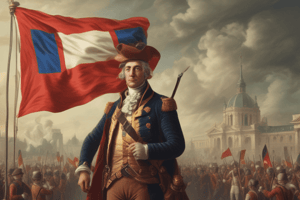Podcast
Questions and Answers
Quel modèle de l'univers, géocentrique ou héliocentrique, affirme que la Terre est le centre de l'univers ?
Quel modèle de l'univers, géocentrique ou héliocentrique, affirme que la Terre est le centre de l'univers ?
- Géocentrique (correct)
- Héliocentrique
Qui a proposé le modèle héliocentrique de l'univers, plaçant le soleil au centre ?
Qui a proposé le modèle héliocentrique de l'univers, plaçant le soleil au centre ?
- Galilée
- Isaac Newton
- Nicolaus Copernic (correct)
Laquelle des affirmations suivantes décrit avec précision la révolution scientifique ?
Laquelle des affirmations suivantes décrit avec précision la révolution scientifique ?
- Une période de changements radicaux dans les idées scientifiques, conduisant à une nouvelle compréhension du monde. (correct)
- Une révolution politique qui a renversé les monarques européens.
- Une période de guerres civiles dans toute l'Europe.
Quel est le nom de l'accord entre les révolutionnaires français et le roi Louis XVI en 1789, qui a tenté de créer une nouvelle constitution ?
Quel est le nom de l'accord entre les révolutionnaires français et le roi Louis XVI en 1789, qui a tenté de créer une nouvelle constitution ?
Nommez un des personnages clés de la révolution française.
Nommez un des personnages clés de la révolution française.
Quels sont les principaux objectifs de la révolution industrielle ?
Quels sont les principaux objectifs de la révolution industrielle ?
Nommez l'une des principales causes de la révolution industrielle.
Nommez l'une des principales causes de la révolution industrielle.
Qu'est-ce qui qualifie un traité / une rencontre comme un « point de basculement » ?
Qu'est-ce qui qualifie un traité / une rencontre comme un « point de basculement » ?
Le traité de Versailles a été écrit par les vainqueurs de la Première Guerre mondiale.
Le traité de Versailles a été écrit par les vainqueurs de la Première Guerre mondiale.
Lequel des termes suivants fait référence à un gouvernement dans lequel un seul dirigeant détient tout le pouvoir et est souvent héréditaire?
Lequel des termes suivants fait référence à un gouvernement dans lequel un seul dirigeant détient tout le pouvoir et est souvent héréditaire?
Lequel des termes suivants fait référence à un traité ou à une alliance formelle entre deux ou plusieurs nations?
Lequel des termes suivants fait référence à un traité ou à une alliance formelle entre deux ou plusieurs nations?
Lequel des termes suivants décrit une théorie scientifique qui affirme que la Terre est au centre de l'univers?
Lequel des termes suivants décrit une théorie scientifique qui affirme que la Terre est au centre de l'univers?
Qu'est-ce qu'une source primaire?
Qu'est-ce qu'une source primaire?
Qu'est-ce que le socialisme?
Qu'est-ce que le socialisme?
Quels étaient les objectifs clés de la Révolution française?
Quels étaient les objectifs clés de la Révolution française?
Qu'est-ce qu'un protectorat?
Qu'est-ce qu'un protectorat?
Expliquez brièvement le concept de « l'homme blanc ».
Expliquez brièvement le concept de « l'homme blanc ».
La Première Guerre mondiale a été causée par un seul événement, l'assassinat de l'archiduc François-Ferdinand.
La Première Guerre mondiale a été causée par un seul événement, l'assassinat de l'archiduc François-Ferdinand.
Lequel des termes suivants fait référence à l'influence d'une nation puissante sur une autre?
Lequel des termes suivants fait référence à l'influence d'une nation puissante sur une autre?
Qui a écrit « Le Contrat social »?
Qui a écrit « Le Contrat social »?
Que signifie nationalisme au cours de l'ère impériale ?
Que signifie nationalisme au cours de l'ère impériale ?
Quel est le principal problème que pose le concept de « fardeau de l'homme blanc » ?
Quel est le principal problème que pose le concept de « fardeau de l'homme blanc » ?
Que signifie fédéralisme?
Que signifie fédéralisme?
Que signifie militarisme?
Que signifie militarisme?
Expliquez les causes et les effets de la Révolution industrielle.
Expliquez les causes et les effets de la Révolution industrielle.
Que signifie "Crédible Source / Fiabilité"?
Que signifie "Crédible Source / Fiabilité"?
Qu'est-ce que le droit naturel ?
Qu'est-ce que le droit naturel ?
L'héliocentrisme est la croyance selon laquelle la Terre est au centre de l'univers.
L'héliocentrisme est la croyance selon laquelle la Terre est au centre de l'univers.
Flashcards
Vocabulaire
Vocabulaire
Une liste de mots importants à connaître pour comprendre le sujet.
Personnes importantes
Personnes importantes
Des personnalités influentes qui ont joué un rôle majeur dans le sujet traité.
Évènements et Concepts Importants
Évènements et Concepts Importants
Des événements clés et des concepts fondamentaux qui ont façonné le domaine d'étude.
Study Notes
Vocabulary Terms
- Absolute Monarchy: A form of government where a single ruler holds absolute power.
- Alliances: Agreements between countries to support each other.
- Bias: A prejudice or predisposition toward a particular point of view.
- Cholera: A severe infectious disease.
- Colony: A territory under the political control of another country.
- Constitutional Monarchy: A system of government in which a monarch's power is limited by a constitution.
- Credible Source/Reliability: Sources that are trustworthy and can be relied upon for accurate information.
- Declaration of the Rights of Man and Citizen: A document asserting the rights of individuals during the French Revolution.
- Democracy: A system of government by the people, exercised directly or through elected representatives.
- Divine Right of Kings: The belief that a monarch's right to rule comes directly from God.
- Estate (French Revolution): Social classes in pre-revolutionary France.
- Geocentric Theory (Model): The theory that the Earth is the center of the universe.
- Heliocentric Theory (Model): The theory that the Sun is the center of the solar system.
- Imperialism: The policy of extending a country's power and influence through diplomacy or military force.
- Labor unions: Organizations of workers formed to protect their rights and interests.
- Militarism: A belief in the importance of military strength.
- Nationalism: A strong feeling of pride and loyalty to one's country.
- Natural Rights: Rights that are inherent to all people, such as the right to life, liberty, and property.
- Primary Source: Original documents or objects that provide firsthand accounts of events.
- Protectorate: A state that is under the protection of another more powerful state.
- Social Contract: An agreement between people and their government, defining the rights and responsibilities of both.
- Social Darwinism: A theory applying Darwin's ideas of natural selection to human society.
- Sphere of Influence: A region where one country has significant political or economic influence.
- Thesis: A statement or argument that is supported with evidence and reasoning.
Important People
- Cesare Beccaria: An Italian philosopher who advocated for criminal justice reform.
- Simón Bolívar: A South American revolutionary leader.
- Napoleon Bonaparte: A French military and political leader.
- Nicolaus Copernicus: A Polish astronomer who formulated the heliocentric model of the solar system.
- Galileo Galilei: An Italian astronomer and physicist.
- Thomas Hobbes: An English philosopher who wrote about the social contract.
- John Locke: An influential English philosopher.
- Emperor Menelik II: Emperor of Ethiopia during the late 19th century
- Baron de Montesquieu: A French political philosopher.
- Sir Isaac Newton: A key figure in the scientific revolution.
- Mangal Pandey: A sepoy who instigated the Indian Sepoy Mutiny.
- Rani Lakshmi Bai: A leader of the Indian Rebellion of 1857.
- Jean-Jacques Rousseau: A Genevan philosopher.
- Adam Smith: A Scottish economist and philosopher.
- Queen Mother Yaa Asantewaa: Leader of the Ashanti resistance against British colonization.
- Gavrilo Princip: The assassin who triggered World War I.
- Archduke Franz Ferdinand: Heir to the Austro-Hungarian throne.
Important Events & Concepts
- Analyzing Political Cartoons: Studying political cartoons to understand historical events and perspectives.
- Challenges to traditional ways of thinking : Examples include the Protestant Reformation and the Enlightenment.
- Protestant Reformation: A religious movement that challenged the Catholic Church.
- Enlightenment/Age of Reason: A historical period emphasizing reason and individualism.
- Effects of the Enlightenment on the American Revolution: The Enlightenment principles influenced the American Revolution by promoting ideas of individual rights and self-governance.
- Effects of the Enlightenment on the French Revolution: The Enlightenment similarly inspired concepts of liberty and equality in France.
- French Revolution: A period of radical social and political change in France.
- Latin American Revolutions: Independence movements in Latin America.
- Citizens: People in a political community.
- Causes and effects of Industrial Revolution: The factors driving and the outcomes of the Industrial Revolution.
- Why England?: The specific factors that led to the Industrial Revolution beginning in England.
- Effects on all social classes and men/women/children: The social impacts of industrialization on different population groups.
- Causes and effects of Imperialism: External factors and outcomes of imperialistic expansion.
- Boxer Rebellion: A Chinese nationalist uprising against foreign influence.
- Napoleonic Code: Napoleon's legal system.
- White Man's Burden: A racist justification for imperialism.
- Meiji Restoration: A period of large-scale reforms in Japan.
- Successes and failures in resisting imperialism: Various accounts and results of colonial resistance.
- MAIN Causes of World War I: The four main causes: Militarism, Alliances, Imperialism, and Nationalism.
- Powder Keg of Europe: The volatile political environment in Europe leading up to World War I.
- Contributions of colonies during WWI: Involvement of overseas territories in the war effort.
- Major provisions of the Treaty of Versailles and how it affects Germany: The terms of the treaty and their consequences for Germany's future.
- Armenian Genocide: A systematic killing of Armenians by the Ottoman Empire.
Studying That Suits You
Use AI to generate personalized quizzes and flashcards to suit your learning preferences.





